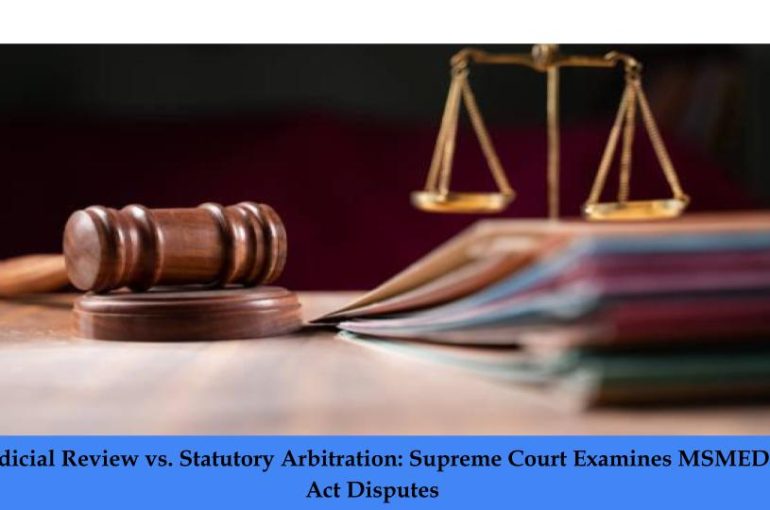Judicial Review vs. Statutory Arbitration: Supreme Court Examines MSMED Act Disputes
On January 22, 2025, the Supreme Court of India delivered a significant judgment in the case of M/s TamilNadu Cements Corporation Limited (TANCEM) v. Micro and Small Enterprises Facilitation Council (MSEFC) & Another 2025 INSC 91. This case addressed critical legal questions concerning the interplay between the Micro, Small, and Medium Enterprises Development Act, 2006 (MSMED Act) and the Arbitration and Conciliation Act, 1996 (A&C Act), particularly focusing on the maintainability of writ petitions under Article 226 of the Constitution against orders passed by the MSEFC. Below is a detailed analysis of the facts, legal issues, court reasoning, and implications of this landmark decision.
Background Facts
The Appellant, TANCEM, is a government-owned entity operating cement manufacturing units. TANCEM entered into a turnkey contract with M/s Unicon Engineers in 2010 for the design, supply, erection, and commissioning of two Electrostatic Precipitators (ESPs). The contract, valued at over Rs. 7.5 crore, aimed to improve the efficiency of TANCEM’s clinker cooler units.
However, disputes arose due to alleged delays, substandard work, and failure to meet contractual obligations by M/s Unicon Engineers. TANCEM issued several warnings and engaged other contractors for modifications. Subsequently, MSEFC under Section 18 of the MSMED Act, claimed an amount of Rs. 2.66 crore with interest for unpaid dues and cost overruns. The MSEFC, acting under statutory powers, directed TANCEM to pay specific amounts with compounded interest.
Legal Issues Raised
The case raised three primary legal issues:
- Whether a writ petition can be entertained against orders passed by the MSEFC under the MSMED Act, particularly when statutory remedies are available under the A&C Act.
- Whether MSEFC members who undertake conciliation can subsequently act as arbitrators, considering the bar under Section 80 of the A&C Act.
- Whether the mandatory pre-deposit of 75% of the award amount under Section 19 imposes an onerous and burdensome condition on the right to challenge the award.
Court Proceedings and Decisions
MSEFC Order
The MSEFC held that TANCEM was liable to pay the claimed amount along with interest. The council based its decision on Sections 15, 16, and 17 of the MSMED Act, which mandate timely payment to suppliers and impose a high rate of interest for delayed payments.
High Court of Judicature at Madras
M/s Unicon Engineers initiated execution proceedings for the recovery of the awarded amount in the High Court of Judicature at Madras. TANCEM filed objections under Section 34 of the A&C Act but failed to comply with the pre-deposit condition under Section 19 of the MSMED Act. The High Court dismissed TANCEM’s objections on the grounds of non-compliance and limitation. TANCEM also filed a writ petition challenging the vires of Sections 16 to 19 of the MSMED Act, which was tagged with similar petitions pending before the Supreme Court.
Supreme Court Judgment
The Supreme Court, acknowledging conflicting precedents, referred the following key issues to a larger bench:
- Whether writ petitions under Article 226 are absolutely barred against MSEFC orders.
- The circumstances under which writ jurisdiction can be exercised despite the availability of statutory remedies.
- The role of MSEFC members acting as arbitrators after conducting conciliation.
Legal Analysis
Section 18 of the MSMED Act provides for mandatory conciliation and arbitration in disputes involving micro and small enterprises. The provisions override contractual arbitration agreements and confer jurisdiction on the MSEFC or a designated arbitral institution. Section 19 mandates a pre-deposit of 75% of the awarded amount for challenging an award under the A&C Act. While this condition may seem onerous, it is designed to ensure prompt payments to micro and small enterprises, which often face financial difficulties due to delayed payments.
The Court reiterated that the rule of alternative remedies does not oust the jurisdiction of High Courts under Article 226. Exceptions include cases of fundamental rights violations, lack of jurisdiction, or challenges to the vires of a statute. The Supreme Court noted divergent views in prior cases. In Jharkhand Urja Vikas Nigam Ltd. v. State of Rajasthan (2021) 19 SCC 206, the Court held that writ petitions are maintainable in certain circumstances. In M/s India Glycols Ltd. v. MSEFC 2023 SCC OnLine SC 1852, the Court ruled that writ petitions are barred due to the availability of statutory remedies.
Conclusion
The Supreme Court’s judgment in this case highlights the delicate balance between ensuring the expeditious resolution of disputes under the MSMED Act and safeguarding the constitutional right to access justice under Article 226. By referring critical issues to a larger bench, the Court aims to clarify the scope of judicial review in cases involving statutory arbitration and harmonize conflicting precedents. This case serves as a reminder of the importance of statutory frameworks like the MSMED Act in protecting the interests of micro and small enterprises while ensuring adherence to principles of natural justice and fair procedure. The forthcoming decision of the larger bench will likely have far-reaching implications for the interpretation and application of the MSMED Act and its interplay with constitutional rights.
Sakshi Raghuvanshi
Senior Legal Associate
The Indian Lawyer & Allied Services
Editors comments
This case deals with the importance of a special law prevailing over general law. The Indian laws recognize that when there is a special law for a particular sector then in such an event the special law will apply. This ensures that the facts of the case can be decided only under that particular law that has been created by statute for the benefit of a particular sector thereby bringing finality to the decision.
Sushila Ram Varma
Chief Legal Consultant
The Indian Lawyer & Allied Services





































Leave a Reply